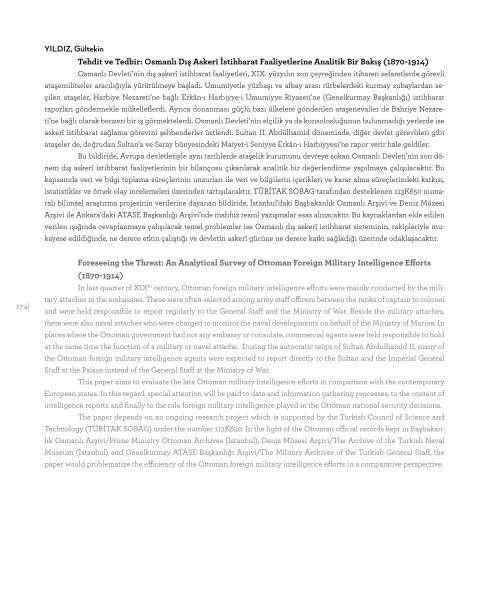14 - 17
MdZ0re
MdZ0re
You also want an ePaper? Increase the reach of your titles
YUMPU automatically turns print PDFs into web optimized ePapers that Google loves.
YILDIZ, Gültekin<br />
Tehdit ve Tedbir: Osmanlı Dış Askeri İstihbarat Faaliyetlerine Analitik Bir Bakış (1870-19<strong>14</strong>)<br />
Osmanlı Devleti’nin dış askerî istihbarat faaliyetleri, XIX. yüzyılın son çeyreğinden itibaren sefaretlerde görevli<br />
ataşemiliterler aracılığıyla yürütülmeye başladı. Umumiyetle yüzbaşı ve albay arası rütbelerdeki kurmay subaylardan seçilen<br />
ataşeler, Harbiye Nezareti’ne bağlı Erkân-ı Harbiyye-i Umumiyye Riyaseti’ne (Genelkurmay Başkanlığı) istihbarat<br />
raporları göndermekle mükelleflerdi. Ayrıca donanması güçlü bazı ülkelere gönderilen ataşenevaller de Bahriye Nezareti’ne<br />
bağlı olarak benzeri bir iş görmektelerdi. Osmanlı Devleti’nin elçilik ya da konsolosluğunun bulunmadığı yerlerde ise<br />
askerî istihbarat sağlama görevini şehbenderler üstlendi. Sultan II. Abdülhamid döneminde, diğer devlet görevlileri gibi<br />
ataşeler de, doğrudan Sultan’a ve Saray bünyesindeki Maiyet-i Seniyye Erkân-ı Harbiyyesi’ne rapor verir hale geldiler.<br />
Bu bildiride, Avrupa devletleriyle aynı tarihlerde ataşelik kurumunu devreye sokan Osmanlı Devleti’nin son dönem<br />
dış askerî istihbarat faaliyetlerinin bir bilançosu çıkarılarak analitik bir değerlendirme yapılmaya çalışılacaktır. Bu<br />
kapsamda veri ve bilgi toplama süreçlerinin unsurları ile veri ve bilgilerin içerikleri ve karar alma süreçlerindeki katkısı,<br />
istatistikler ve örnek olay incelemeleri üzerinden tartışılacaktır. TÜBİTAK SOBAG tarafından desteklenen 113K650 numaralı<br />
bilimsel araştırma projesinin verilerine dayanan bildiride, İstanbul’daki Başbakanlık Osmanlı Arşivi ve Deniz Müzesi<br />
Arşivi ile Ankara’daki ATASE Başkanlığı Arşivi’nde mahfuz resmî yazışmalar esas alınacaktır. Bu kaynaklardan elde edilen<br />
verilen ışığında cevaplanmaya çalışılacak temel problemler ise Osmanlı dış askerî istihbarat sisteminin, rakipleriyle mukayese<br />
edildiğinde, ne derece etkin çalıştığı ve devletin askerî gücüne ne derece katkı sağladığı üzerinde odaklaşacaktır.<br />
274|<br />
Foreseeing the Threat: An Analytical Survey of Ottoman Foreign Military Intelligence Efforts<br />
(1870-19<strong>14</strong>)<br />
In last quarter of XIX th century, Ottoman foreign military intelligence efforts were mainly conducted by the military<br />
attaches in the embassies. These were often selected among army staff officers between the ranks of captain to colonel<br />
and were held responsible to report regularly to the General Staff and the Ministry of War. Beside the military attaches,<br />
there were also naval attaches who were charged to monitor the naval developments on behalf of the Ministry of Marine. In<br />
places where the Ottoman government had not any embassy or consulate, commercial agents were held responsible to hold<br />
at the same time the function of a military or naval attache. During the autocratic reign of Sultan Abdulhamid II, many of<br />
the Ottoman foreign military intelligence agents were expected to report directly to the Sultan and the Imperial General<br />
Staff at the Palace instead of the General Staff at the Ministry of War.<br />
This paper aims to evaluate the late Ottoman military intelligence efforts in comparison with the contemporary<br />
European states. In this regard, special attention will be paid to data and information gathering processes, to the content of<br />
intelligence reports and finally to the role foreign military intelligence played in the Ottoman national security decisions.<br />
The paper depends on an ongoing research project which is supported by the Turkish Council of Science and<br />
Technology (TÜBİTAK SOBAG) under the number 113K650. In the light of the Ottoman official records kept in Başbakanlık<br />
Osmanlı Arşivi/Prime Ministry Ottoman Archives (Istanbul), Deniz Müzesi Arşivi/The Archive of the Turkish Naval<br />
Museum (Istanbul) and Genelkurmay ATASE Başkanlığı Arşivi/The Military Archives of the Turkish General Staff, the<br />
paper would problematize the efficiency of the Ottoman foreign military intelligence efforts in a comparative perspective.


